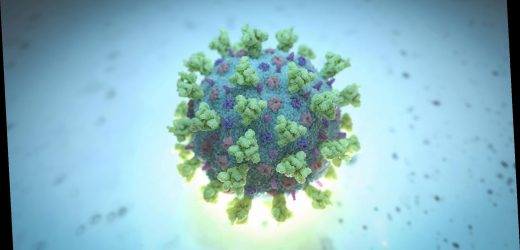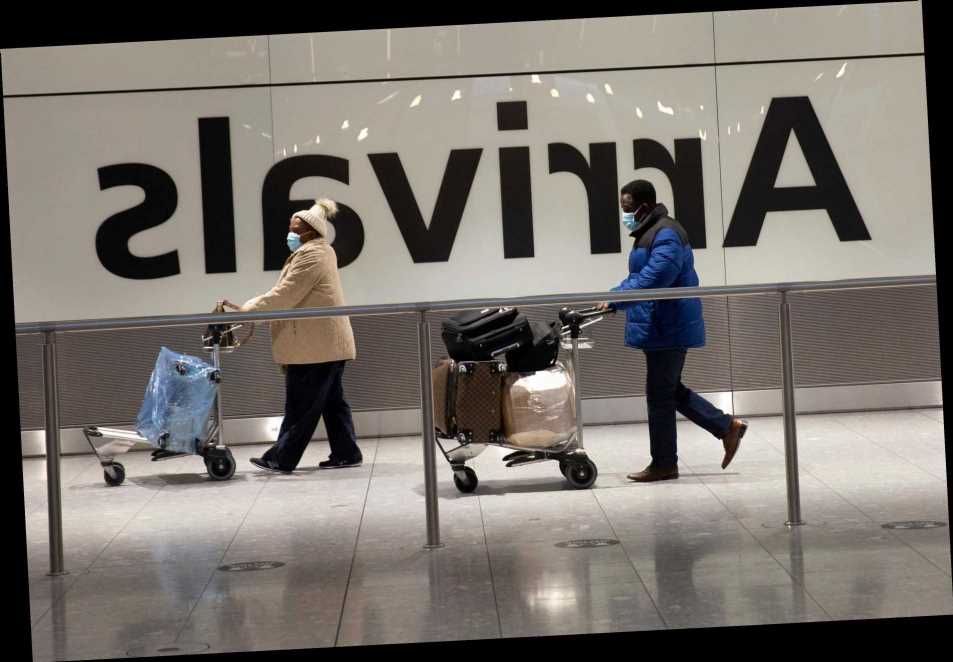NINETY cases of the mutant South African Covid strain have now been detected in the UK, health officials said.
Public Health England said the B.1.351 strain has now been picked up 90 times through genomic sequencing.
? Read our coronavirus live blog for the latest news & updates
However, that figure could be even higher as just 10 per cent of random positive samples are analysed from the UK's national testing programme.
It's a rise from the 77 detected cases of the South African variant, called 501.V2, announced by Health Secretary Matt Hancock on Sunday.
He said at this stage, the known cases were people who had travelled from South Africa or had contact with someone else who had done so.
The PHE report also shows that thousands more cases of the UK variant – called VUI2020/01 – have been discovered since it was first picked up in Kent in September last year.
Genomic sequencing detected 28,122 cases – an increase of 3,714 since the last update a week ago.
But again, this is likely to be less than the actual number of cases due to PHE testing one in 10 positive samples.
The UK variant has already become the country's dominant strain – and makes up around two third of all new cases.
It means that it is likely to be infecting millions of Brits, while Boris Johnson warned the new strain is more deadly than the original.
The number of Brazilian mutant strain cases detected in the UK has also risen to 14.
But it differs from the two more contagious variants of the virus which have recently emerged in the South American nation.
The more concerning of the two, a 'super Brazilian strain' – which was picked up in travellers in Japan – has not yet been found in Britain.
The variant led to ministers banning all flights from the country to the UK and other parts of South America.
What are the two different Covid strains from Brazil?
There are two new coronavirus variants emerging in Brazil, with one causing more concern than the other.
The variant that has led to the banning of all flights from South America has not been detected in the UK, while the other mutation has, but is of little concern.
So, what do we know about the new variants?
Brazil variant 'causing concern' (P1)
The Brazilian variant (P1) has three key mutations in the spike receptor binding domain (RBD) that largely mirror some of the mutations experts are worried about in the South African variant.
The coronavirus RBD is one of the main targets for our immune defences and also the region targeted by vaccines. Changes within this region are therefore worrisome.
Experts detected the new variant circulating in December in Manaus, north Brazil.
It is not yet known if the mutation causes more severe Covid-19, but evidence suggests it may be more transmissible.
Porton Down scientists are conducting more analysis to confirm evidence that indicates the strain does not cause any higher mortality rate or that it affects the vaccines or treatments.
It was detected in Brazil and in travellers from Brazil to Japan, and contains a unique constellation of lineage defining mutations.
Like the South African variant, the Brazilian one carries a mutation in the spike protein called E484K, which is not present in the UK strain.
The E484K mutation has been shown to reduce antibody recognition, helping the virus to bypass immune protection provided by prior infection or vaccination.
Scientists analysing the Brazilian variant say the mutations it shares with the South African variant seem to be associated with a rapid increase in cases in locations where previous attack rates are thought to be very high.
They say it is therefore essential to rapidly investigate whether there is an increased rate of re-infection in previously exposed individuals.
The other Brazilian variant (P2)
This one has been detected in the UK, but experts say it is no cause for concern.
It has been reported to be spreading in the Rio de Janeiro State, and is associated with two independent reinfection cases in Brazil, according to the Covid-19 Genomics UK (Cog-UK) consortium.
While it also carries the E484K mutation, it is not currently considered sufficient to designate it as a "Variant of Concern".
This variant (P2) does not contain the other important mutations carried by the more concerning variant (P1).
According to Cog-UK, although some cases of the P2 have been detected in the UK, other variants with this mutation have also been observed.
Cog-UK said that as of January 15, 11 cases of the variant had been detected in the UK.
Analysis of both variants is ongoing
While it hasn't been picked up by the PHE sample testing, experts say it could have already entered Britain.
Brazil and South Africa are expected to be among 30 other "high risk" countries expected to be added to the UK quarantine list due to be published later today.
The countries on the list are areas where dangerous variants have emerged or cases and death ares are soaring.
Travellers will be forced to quarantine in hotels for 10 days on their return and pay for their own accommodation.
JAB FEARS
Although early indications are that vaccines will work, experts say it is still too early to be sure if they will be effective against the Brazilian and South African variants, while it is thought they will work against the UK variant.
Nevertheless a new coronavirus jab could be manufactured within just 30 to 40 days if a variant of the virus is found to be less responsive to the vaccines available, according to Nadhim Zahawi, vaccine development minister.
He told the Commons Science and Technology Committee that that measures have been put in place to produce the "next iteration" of jabs if needed.
Experts say the new vaccines are essentially like emails that we send to the immune system, and are very easy to tweak.
If the virus has changed, that email simply has to be edited, with a word or two changed, and in a number of weeks a new vaccine will be ready that can better target the new strain.
Last week, Boris Johnson warned the vaccine may not be as effective against variants from abroad, but said: "It's likely the vaccine we have now is going to protect against the UK variant, and its going to provide protection to the other variants as well, its just to what degree the efficacy might change."
Sir Patrick Vallance, the Government's chief scientific adviser, cautioned that some of the new mutations may be able to "get round" the vaccines.
But, he said that it was a "miracle" there was a vaccine at all, adding it is "really quite easy" to adjust the jabs to deal with mutations in the virus.
Source: Read Full Article





